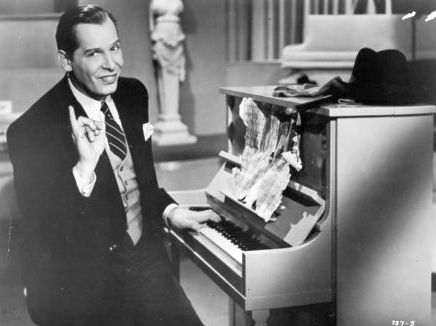Happy Birthday, Milton Berle!
At the height of his phenomenal fame on television as the star of The Texaco Star Theatre, Milton Berle was the target of a hilarious barb from fellow comedian Joe E. Lewis: “Milton Berle is responsible for the sale of more television sets than any other performer…I know I sold mine and my brother sold his.” (Lewis had conceived the gag in 1947, when Berle was still on radio—but “Uncle Miltie’s” boob tube popularity allowed Joe to rework the joke.) Truth be told, a lot of people invested in those newfangled sets just to see this crazy comedian everyone was talking about. Born Milton (some sources say Mendel) Berlinger in New York City on this date in 1908, Berle would become an entertainment icon. It is not for nothing that he’s reverently referred to as “Mr. Television.”
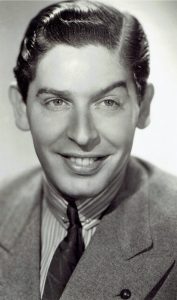 Berlinger wouldn’t change his name to “Milton Berle” until he was 16…but by the age of five, he was already a show business veteran. He was encouraged by his mother Sarah, who promoted him as a child actor in silent films like The Perils of Pauline (1914) and Rebecca of Sunnybrook Farm (1917). Berle acknowledged that he appeared in close to fifty features in the silent era (including The Mark of Zorro [1920] and Tess of the Storm Country [1922]) while actively pursuing a vaudeville career. In 1920, at the age of 12, Milton made his stage debut in a production of the musical comedy Floradora in Atlantic City, New Jersey. By 16, he was working solo as a “Master of Ceremonies” in vaudeville, invading other acts on the bill with the brash, smartass style that would make him famous (and which Berle acknowledged he patterned after one of vaudeville’s top comics, Ted Healy—the man responsible for bringing us The Three Stooges). During his stage career, Milton developed his reputation as a “chooser”—vaudeville slang for a joke thief. “I never stole a joke in my life,” he once insisted, tongue-in-cheek. “I just find them before they’re lost.” (This propensity for lifting other comics’ material earned him the hilarious appellation “The Thief of Bad Gags.”)
Berlinger wouldn’t change his name to “Milton Berle” until he was 16…but by the age of five, he was already a show business veteran. He was encouraged by his mother Sarah, who promoted him as a child actor in silent films like The Perils of Pauline (1914) and Rebecca of Sunnybrook Farm (1917). Berle acknowledged that he appeared in close to fifty features in the silent era (including The Mark of Zorro [1920] and Tess of the Storm Country [1922]) while actively pursuing a vaudeville career. In 1920, at the age of 12, Milton made his stage debut in a production of the musical comedy Floradora in Atlantic City, New Jersey. By 16, he was working solo as a “Master of Ceremonies” in vaudeville, invading other acts on the bill with the brash, smartass style that would make him famous (and which Berle acknowledged he patterned after one of vaudeville’s top comics, Ted Healy—the man responsible for bringing us The Three Stooges). During his stage career, Milton developed his reputation as a “chooser”—vaudeville slang for a joke thief. “I never stole a joke in my life,” he once insisted, tongue-in-cheek. “I just find them before they’re lost.” (This propensity for lifting other comics’ material earned him the hilarious appellation “The Thief of Bad Gags.”)
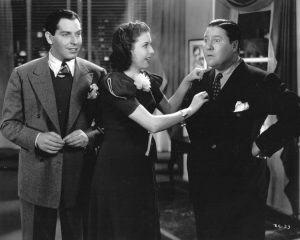 Milton Berle was headlining at New York’s Palace Theatre (the “Mecca” of Vaudeville) by the age of 21. His Broadway work included Earl Carroll’s Vanities (a 1932 revue) and Saluta (1934). In 1936, he was anxious to get back into motion pictures, so he did a screen test for producer Samuel Goldwyn. Goldwyn took a pass, but RKO wanted his services—which resulted in young Milton appearing in such movie vehicles as New Faces of 1937 (1937) and Radio City Revels (1938). Berle also made several films for 20th Century-Fox in the 1940s: Tall, Dark and Handsome (1941—one of my favorites), Sun Valley Serenade (1941), Whispering Ghosts (1942), and Margin for Error (1943), to name a few. Towards the end of the decade, Milton would make Always Leave Them Laughing (1949) for Warner Brothers…a movie whose protagonist (a vaudeville comic) was clearly near-and-dear to his heart.
Milton Berle was headlining at New York’s Palace Theatre (the “Mecca” of Vaudeville) by the age of 21. His Broadway work included Earl Carroll’s Vanities (a 1932 revue) and Saluta (1934). In 1936, he was anxious to get back into motion pictures, so he did a screen test for producer Samuel Goldwyn. Goldwyn took a pass, but RKO wanted his services—which resulted in young Milton appearing in such movie vehicles as New Faces of 1937 (1937) and Radio City Revels (1938). Berle also made several films for 20th Century-Fox in the 1940s: Tall, Dark and Handsome (1941—one of my favorites), Sun Valley Serenade (1941), Whispering Ghosts (1942), and Margin for Error (1943), to name a few. Towards the end of the decade, Milton would make Always Leave Them Laughing (1949) for Warner Brothers…a movie whose protagonist (a vaudeville comic) was clearly near-and-dear to his heart.
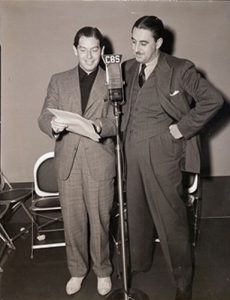 Berle’s ambition was such that he was anxious to conquer every area of show business—particularly the aural medium. He would later acknowledge that “for a guy who never made it big on radio I was always on.” (Old-time radio historian John Dunning once described Milton as “radio’s best-known failure.”) His early radio appearances include guest shots on Rudy Vallee’s The Fleischmann’s Yeast Hour and a regular stint on The Fred Waring Show. By the fall of 1936, he was the host of The Gillette Original Community Sing. The Sunday night CBS comedy-variety program showcased Berle’s “machine gun comedy” style, which was similar to that of Bob Hope’s (both comics admitted borrowing a lot from the aforementioned Ted Healy). In his autobiography, Berle recalled that the program’s theme song (which he sang in the opening) was Let’s All Sing Like the Birdies Sing, which would require the audience to respond: “Tweet, tweet, tweet, tweet, tweet!”
Berle’s ambition was such that he was anxious to conquer every area of show business—particularly the aural medium. He would later acknowledge that “for a guy who never made it big on radio I was always on.” (Old-time radio historian John Dunning once described Milton as “radio’s best-known failure.”) His early radio appearances include guest shots on Rudy Vallee’s The Fleischmann’s Yeast Hour and a regular stint on The Fred Waring Show. By the fall of 1936, he was the host of The Gillette Original Community Sing. The Sunday night CBS comedy-variety program showcased Berle’s “machine gun comedy” style, which was similar to that of Bob Hope’s (both comics admitted borrowing a lot from the aforementioned Ted Healy). In his autobiography, Berle recalled that the program’s theme song (which he sang in the opening) was Let’s All Sing Like the Birdies Sing, which would require the audience to respond: “Tweet, tweet, tweet, tweet, tweet!”
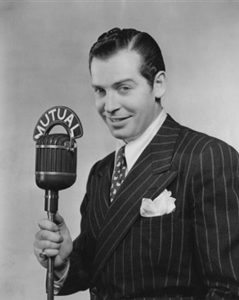 Milton later went on to host NBC’s Stop Me If You’ve Heard This One in the fall of 1939—a comedy show on which panel members would attempt to finish jokes sent in by the show’s listening audience. (Three of the show’s panelists went on to further radio fame: Harry Hershfield and “Senator” Ed Ford on the similar [but better known] Can You Top This?, and Harry McNaughton on It Pays to Be Ignorant.) Berle then resurfaced in 1941 on Three Ring Time, a comedy-variety program for Ballantine Ale that ran for a season on both the Mutual and Blue networks. Though the program received favorable critical buzz, it turned into a complete bust—much of it due to the squabbling of Berle and co-star Charles Laughton. Milton tried radio three more times as a headliner: a brief self-titled series over CBS in 1943 for Campbell Soups; a 1944-45 “half-hour of slapstick” for Blue/CBS called Let Yourself Go (sponsored by Eversharp); and a summer series over CBS in 1946 known as Kiss and Make Up. The latter was a gimmick program that found “judge” Berle presiding over a mock court. (This one was created by writer-producer Cy Howard, later responsible for My Friend Irma and Life With Luigi.)
Milton later went on to host NBC’s Stop Me If You’ve Heard This One in the fall of 1939—a comedy show on which panel members would attempt to finish jokes sent in by the show’s listening audience. (Three of the show’s panelists went on to further radio fame: Harry Hershfield and “Senator” Ed Ford on the similar [but better known] Can You Top This?, and Harry McNaughton on It Pays to Be Ignorant.) Berle then resurfaced in 1941 on Three Ring Time, a comedy-variety program for Ballantine Ale that ran for a season on both the Mutual and Blue networks. Though the program received favorable critical buzz, it turned into a complete bust—much of it due to the squabbling of Berle and co-star Charles Laughton. Milton tried radio three more times as a headliner: a brief self-titled series over CBS in 1943 for Campbell Soups; a 1944-45 “half-hour of slapstick” for Blue/CBS called Let Yourself Go (sponsored by Eversharp); and a summer series over CBS in 1946 known as Kiss and Make Up. The latter was a gimmick program that found “judge” Berle presiding over a mock court. (This one was created by writer-producer Cy Howard, later responsible for My Friend Irma and Life With Luigi.)
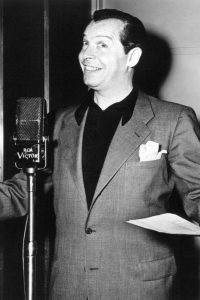 1947 found Berle seriously wanting to succeed in radio, so much so that he cancelled several lucrative nightclub appearances (that would have netted him $25,000 weekly) to break his radio jinx with Philip Morris’ The Milton Berle Show, a Tuesday NBC program beginning March 11, 1947. Though the show barely made a dent in the ratings (its Hooper was a dismal 11.6), it represents some of the comedian’s best radio work. The Milton Berle Show took a weekly satirical look at prominent pop culture phenomena—one week it might be “a salute to relaxation,” the next “a salute to high finance”—and featured a cast that included Arnold Stang (on loan from The Henry Morgan Show), Jack Albertson, Ed Begley, Arthur Q. Bryan, Al Kelly, Pert Kelton, and Mary Shipp. Frank Gallop was Milton’s announcer and a perfect foil for the comedian’s boorish, obnoxious persona (author Gerald Nachman once characterized Berle as “the manic comic who won’t shut up until you laugh”).
1947 found Berle seriously wanting to succeed in radio, so much so that he cancelled several lucrative nightclub appearances (that would have netted him $25,000 weekly) to break his radio jinx with Philip Morris’ The Milton Berle Show, a Tuesday NBC program beginning March 11, 1947. Though the show barely made a dent in the ratings (its Hooper was a dismal 11.6), it represents some of the comedian’s best radio work. The Milton Berle Show took a weekly satirical look at prominent pop culture phenomena—one week it might be “a salute to relaxation,” the next “a salute to high finance”—and featured a cast that included Arnold Stang (on loan from The Henry Morgan Show), Jack Albertson, Ed Begley, Arthur Q. Bryan, Al Kelly, Pert Kelton, and Mary Shipp. Frank Gallop was Milton’s announcer and a perfect foil for the comedian’s boorish, obnoxious persona (author Gerald Nachman once characterized Berle as “the manic comic who won’t shut up until you laugh”).
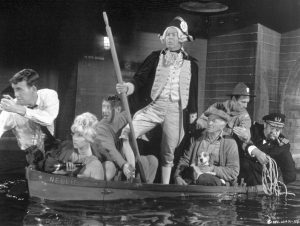 The Milton Berle Show came to an end on April 13, 1948…but in the fall of that same year, Milton was back on ABC with The Texaco Star Theatre—which the comedian later remembered as “the best radio show I ever did…a hell of a funny variety show.” Surviving broadcasts (almost the entire run has resurfaced) back him up on this. It was essentially an extension of his NBC series—Gallop was back as his announcer/foil, along with Stang, Kelly, Kelton, Albertson and Shipp—but it featured first-rate writing from Nat Hiken (who would later create Phil Silvers’ classic TV sitcom), Aaron Ruben (Gomer Pyle, USMC), and two brothers named Neil and Danny Simon. While starring on this show, Milton Berle was already transitioning to the small screen with a TV version of Theatre. He hosted it in June of 1948, but shared those duties monthly with Jack Carter, Morey Amsterdam, and Georgie Price. Berle was hired to host permanently that fall. His Texaco radio show left the airwaves in June of 1949, but he’d continue to be sponsored by the company on TV until 1953. From 1953-55, Buick started paying the bills (The Buick-Berle Show). Milton would do one final season from 1955 to 1956 as The Milton Berle Show, which would also be the same title of his ABC variety hour from 1966-67. “Mr. Television” continued to live up to that nickname for many years afterward in various appearances on TV favorites (F Troop, Batman) and feature films (It’s a Mad, Mad, Mad, Mad World, Who’s Minding the Mint?) until his death in 2002 at the age of 93.
The Milton Berle Show came to an end on April 13, 1948…but in the fall of that same year, Milton was back on ABC with The Texaco Star Theatre—which the comedian later remembered as “the best radio show I ever did…a hell of a funny variety show.” Surviving broadcasts (almost the entire run has resurfaced) back him up on this. It was essentially an extension of his NBC series—Gallop was back as his announcer/foil, along with Stang, Kelly, Kelton, Albertson and Shipp—but it featured first-rate writing from Nat Hiken (who would later create Phil Silvers’ classic TV sitcom), Aaron Ruben (Gomer Pyle, USMC), and two brothers named Neil and Danny Simon. While starring on this show, Milton Berle was already transitioning to the small screen with a TV version of Theatre. He hosted it in June of 1948, but shared those duties monthly with Jack Carter, Morey Amsterdam, and Georgie Price. Berle was hired to host permanently that fall. His Texaco radio show left the airwaves in June of 1949, but he’d continue to be sponsored by the company on TV until 1953. From 1953-55, Buick started paying the bills (The Buick-Berle Show). Milton would do one final season from 1955 to 1956 as The Milton Berle Show, which would also be the same title of his ABC variety hour from 1966-67. “Mr. Television” continued to live up to that nickname for many years afterward in various appearances on TV favorites (F Troop, Batman) and feature films (It’s a Mad, Mad, Mad, Mad World, Who’s Minding the Mint?) until his death in 2002 at the age of 93.
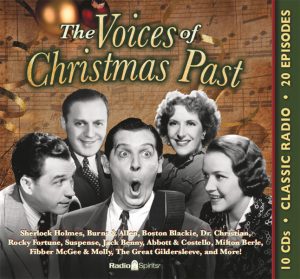 Radio Spirits features two samples from what our own Elizabeth McLeod calls “one of the forgotten bright spots of postwar radio.” Comedy Goes West spotlights an October 7, 1947 broadcast of The Milton Berle Show (“A Salute to the Old West”), and The Voices of Christmas Past reaches back to December 23rd of that same year with a Berle Show entitled “A Salute to Christmas.” You’ll find clips from the birthday boy’s celebrated television series on the DVD collection Funniest Moments of Comedy, plus reminiscences from Irving Brecher (The Wicked Wit of the West) and interviews with David Rothel (Opened Time Capsules) sitting on the voluminous Radio Spirits bookshelf. Happy birthday, Uncle Miltie!
Radio Spirits features two samples from what our own Elizabeth McLeod calls “one of the forgotten bright spots of postwar radio.” Comedy Goes West spotlights an October 7, 1947 broadcast of The Milton Berle Show (“A Salute to the Old West”), and The Voices of Christmas Past reaches back to December 23rd of that same year with a Berle Show entitled “A Salute to Christmas.” You’ll find clips from the birthday boy’s celebrated television series on the DVD collection Funniest Moments of Comedy, plus reminiscences from Irving Brecher (The Wicked Wit of the West) and interviews with David Rothel (Opened Time Capsules) sitting on the voluminous Radio Spirits bookshelf. Happy birthday, Uncle Miltie!

